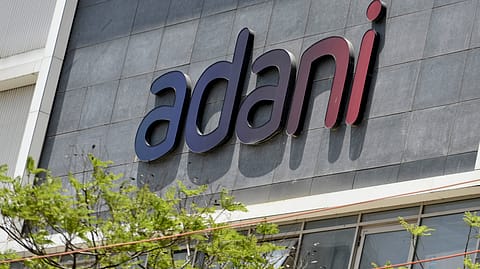Banks' risks from Adani exposure are limited but can increase if loans rise: Moody's
Domestic banks may become the main source of funding for the group, resulting in increases in banks' exposures to Adani, says Moody's.

Indian banks' exposures to Adani Group are not large enough to affect their credit quality materially but risks can increase if the ports-to-power conglomerate becomes more reliant on bank loans, according to Moody's Investors Service.
Banks' exposures to Adani are less than 1% of their total loans, the ratings agency says in its banking sector report.
"While we estimate that the exposures are larger for public sector banks than for private sector banks, they are smaller than 1% of total loans for most banks," it says.
Moody's says the Adani group's access to funding from international markets can be curtailed because of heightened risk perception. "In that case, domestic banks may become the main source of funding for the group, resulting in increases in banks' exposures to Adani and greater risks for them," the report says.
Yet the overall quality of Indian banks' corporate loans will be stable, according to Moody's. "Corporates in general have deleveraged in the past few years. This is reflected in modest growth in their corporate loan books."
The report comes a day after Adani Group said it plans to reduce the overall promoter leverage backed by shares of listed Adani Group companies. "In light of recent market volatility and in continuation of the promoters' commitment to reduce the overall promoter leverage backed by Adani Listed Company shares, we are pleased to inform that promoters have posted the amounts to prepay $1,114 million ahead of its maturity of Sep 2024," the Gautam Adani-led conglomerate said on Monday.
According to Moody's, the exposures are spread across various entities in the Adani group. "We estimate that the bulk of the exposures are collateralised, either with operational assets or with projects under execution, rather than to the corporate level. While some of the exposures may be to the less mature assets of the group, the concentration on operating entities nevertheless reduces risks," the report says.
Recommended Stories
"Despite the events around Adani, we continue to believe that the overall credit quality of Indian banks' corporate loans will be stable," says Moody's, adding that banks' improved capital buffers and profitability will enable them to absorb any potential losses from their exposures to Adani without materially hurting their credit strength.
Meanwhile, Fitch Ratings today said that Indian banks' exposure to the Adani group is insufficient in itself to present substantial risk to the banks' standalone credit profiles. Even under a hypothetical scenario where the wider Adani group enters distress, exposure for Indian banks should, in itself, be manageable without adverse consequences on the banks' ratings, says Fitch.
"Even in a distress scenario, it is unlikely that all of this exposure would be written down, as much of it is tied to performing projects. Loans involving projects still under construction and those at the company level could be more vulnerable. However, even if exposures were fully provisioned for, we do not expect it would affect banks' Viability Ratings, as banks have sufficient headroom at their current rating levels," says Fitch.
The ratings agency, however, says "there is a risk that state banks could face pressure to provide refinancing for Adani entities if foreign banks scale back their exposure or investor appetite for the group's debt weakens in global markets." This, according to Fitch, could affect its assessment of the risk appetite of such banks.
(INR CR)